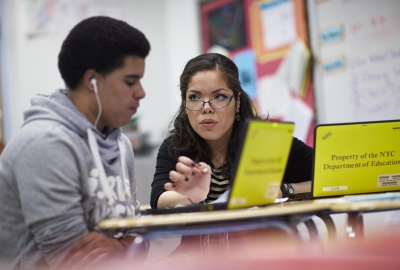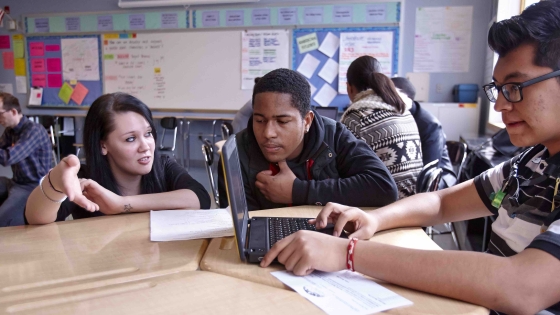
How Two NYC High Schools Work with Students and Families on the Road to College
By Adriana Villavicencio and Tony Laing (2017)
A college degree can make a world of difference for a young person, opening doors to better employment opportunities and higher earnings. In light of this, many high schools are paying more attention to helping their students apply to and enroll in college—and arming them with the skills they will need to succeed on campus. Despite these efforts, high schools often struggle to meet these goals for students who are underrepresented in college, including students of color, low-income students, and first-generation college goers.
This guide provides real-world examples of how two New York City high schools have designed supports for students and their families on the pathway to college. These schools focused on strengthening college supports while participating in NYC’s Expanded Success Initiative (ESI), an effort to increase college readiness for Black and Latino young men. We believe the strategies featured in this guide are applicable not only to ESI’s target population of Black and Latino males, but also to other groups of high school students who may not see themselves in college or lack knowledge about how to get there.
Both schools focus on students’ social, emotional, and academic needs during high school—beginning in 9th grade—and provide clear bridges to life beyond high school graduation. The guide outlines three programs:
- Peer Mentoring at the High School for Law and Public Service (HSLPS): a weekly college-focused class in which 11th and 12th graders are paired with 9th and 10th graders in a single-gender setting;
- Core Pathways at HSLPS: a mandatory 9th grade course consisting of six skill-based modules; and
- Early College Awareness Preparatory Program at El Puente Academy for Peace and Justice: a college preparatory program that includes student and parent/guardian workshops, one-on-one advising, and opportunities for students to meet recent alumni now attending college.
Along with a description of the programs, we include planning documents, information sheets for parents/guardians and students, classroom materials, and other tools educators and students have found successful in their own buildings.
We hope this collection of tools will be useful for school leaders, teachers, and other staff working to provide more robust support for students who may see college as out of reach.

